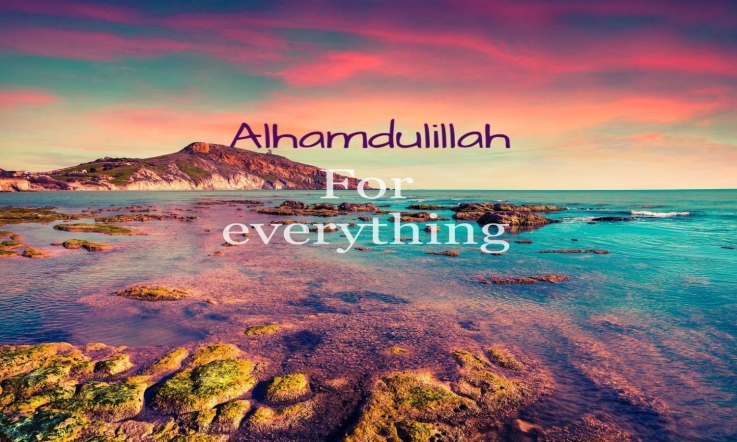
The Concept Of Gratitude
For us Muslims, the concept of gratitude plays a large role in our lives. Gratitude to whom? to Allah SWT. As Muslims, we understand and affirm that Allah SWT, our Creator, is in control of everything that happens to the world and His creation. The main Arabic phrase that we use to imply our gratitude to Allah is “AlHamdulillah”. It comes from the word "Hamd". The concept of gratitude in Islam goes way beyond a few words, so we recommend you to read this article to get a more comprehensive understanding of the concept of gratitude in Islam.
The Meaning of Hamd
In Arabic, the meaning of the word "Hamd" is to praise.That's why our Prophet PBUH's name is Muhammad. His name PBUH means "the one who is praised".
Because Arabic is a complex, yet beautiful language, its words usually tend to have more than one meaning. Another meaning of the word "Hamd '' is gratitude. Therefore, “Hamd” is a combination of showing both praise and gratitude at the same time in a loving way towards something. Learn more meanings of the word "Hamd" here.
The meaning of “AlHamdulillah”
The phrase Al Hamdulillah’s meaning in English translates to "All praise and gratitude is due to Allah ''. Check out the "Al Hamdulillah'' pronunciation here. The reason why we as Muslims say it regularly is because Allah is deserving of all praise and gratitude at all times. Saying this phrase also implies that we are only attributing our praise to Allah alone. In both good times and bad, Muslims are accustomed to saying alhamdulillah for everything.
Here’s Why Allah Is Always Worthy Of Praise and Gratitude
1. Allah has given us life and allowed us to live. If it wasn't for Allah's will to create us, we wouldn't be alive. After all, we didn't create ourselves.
2. Allah has given us everything we have. From our bodies to our minds, jobs, families, lands..and things we are not even aware of or able to perceive.
3. Allah SWT continues to be merciful to us, by not punishing us as soon as we sin.
4. Allah SWT has always gotten us out of difficult times because we have already made it this far in our lives. Think of the last time you thought you couldn't survive a hardship, and look at where you are now.
Allah SWT tells us in the Quran "If you tried to count Allah’s blessings, you would never be able to number them”. (16:18)
It’s true. There are countless blessings we have that we are completely unaware of.
Praising Allah during hardship
Not only do we say Alhamdulillah for our blessings, but for our hardships and difficulties too. Allah SWT has perfect qualities and attributes. Some of these qualities include the fact that He is the Most Merciful, All-Knowing, All-Seeing, and The Most Loving.
Whenever we go through a difficulty, Allah is so Merciful (Al Rahman) in that He never puts us through more than we can handle (as mentioned to us in the second chapter, verse 286 of the Quran).
The fact that Allah SWT is All-Seeing (Al Baseer) and All-Knowing (Al Aalim) means that He knows about everything going on in our lives, from every angle. He also sees everything going on from every angle. Allah allows things to happen to us for our own good. We might never understand why some things happen to us because we can't see or know things like He can. Learn more about why Allah tests us here.
Allah SWT is All-Loving (Al-Wadud). He will never put us through anything unless there is good in it for us, whether in this life or the next. Our Prophet PBUH said in a hadith "I am amazed by the believer. Verily, Allah does not decree anything for the believer except what is good for him" (Musnad Ahmad).
For these reasons, Muslims are always showing praise and gratitude to Allah in all moments of life. Saying Al Hamdulillah also shows Allah that we are grateful for the blessings He has bestowed on us. Allah tells us in the Quran that "If you are grateful, I will certainly give you more" (14:7).
It is important to constantly remember and praise Allah’s blessings by saying Alhamdulillah for everything.
Written by Gheed Al Nassan